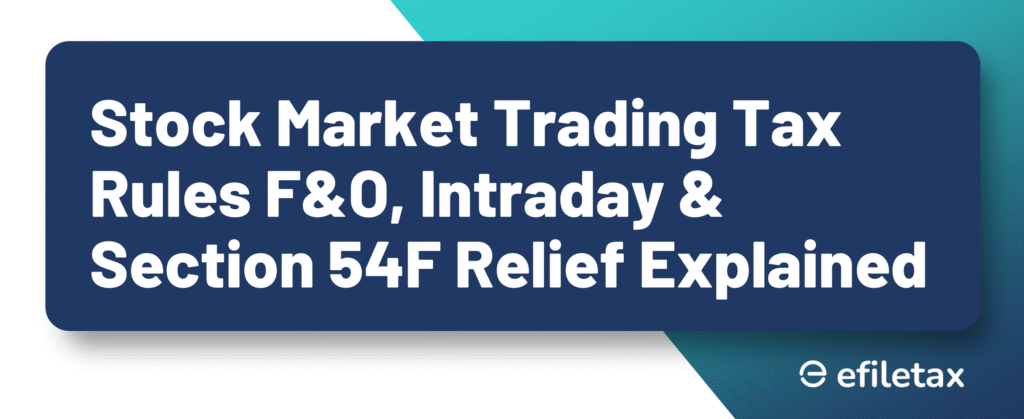
A Quick Guide to Tax on Stock Market Trading in India
If you’re trading in stocks—whether it’s intraday, F&O, or long-term investing—tax on stock market trading is not optional. The Income Tax Department has clear rules, and non-compliance can lead to audit triggers or penalties. Here’s a simplified guide to understand how various stock transactions are taxed in India and how to stay compliant.
Types of Stock Trading & Their Tax Treatment
| Trade Type | Nature as per IT Act | Taxed as | ITR Form Required | Books Required? |
|---|---|---|---|---|
| Delivery (Long Term) | Capital Gains | LTCG/STCG | ITR-2 | No (unless frequent) |
| Intraday | Speculative Business | Slab rate (as business) | ITR-3 | Yes |
| F&O (Futures & Options) | Non-Speculative Business | Slab rate (as business) | ITR-3 | Yes |
Expert Tip: Even if you’ve made a loss, you’re required to report it in the correct ITR form. Carry-forward is only allowed if it’s declared on time.
Focus Keyphrase Section: Tax on Stock Market Trading
Understanding tax on stock market trading helps you avoid penalties and make smart investment decisions.
Key tax rules to remember:
- Intraday trading income is speculative business income (Section 43(5)).
- F&O trading income is non-speculative business income, taxed at slab rates.
- Capital gains apply for delivery-based investments—short-term if held <1 year, long-term if >1 year.
- Losses must be reported to carry forward.
When Does Tax Audit Apply?
As per CBDT’s guidance (Circular No. 3/2023 dated 27.04.2023):
- F&O Turnover > ₹10 crore (with 95% digital transactions): Tax audit is mandatory.
- F&O Turnover > ₹2 crore (if digital transactions <95%): Tax audit is still mandatory.
- Business income > ₹2.5 lakh in prior year? You must maintain books and file ITR-3.
This move curbs tax evasion in high-frequency trading and brings transparency in the digital investment economy.
Section 54F: A Smart Way to Save Tax on Capital Gains
Sold stocks or mutual funds and earned capital gains? You can save tax under Section 54F by:
- Reinvesting the net sale consideration in a residential house in India
- Doing so before the ITR filing deadline—now extended to 15th September 2025 (CBDT Circular No. 6/2025)
This option is especially useful for long-term investors shifting from equities to real estate.
Practical Compliance Guide for Traders
Trade in F&O:
- Maintain books of account (digital preferred)
- File ITR-3, even for losses
- Apply tax audit provisions based on turnover
Trade Intraday:
- Treat it as speculative income
- File ITR-3
- Claim expenses related to trading setup
Invest Long-Term:
- Use ITR-2
- Track STCG (15%) and LTCG (10% above ₹1 lakh threshold)
- Consider 54F for capital gain reinvestment
FAQs
Q1. Can I file ITR-4 for F&O or intraday trading?
No. You must use ITR-3 as it’s treated as business income.
Q2. Is audit compulsory for all F&O traders?
Only if turnover exceeds ₹10 crore (with 95% digital transactions) or ₹2 crore otherwise.
Q3. What if I made only losses in trading?
Still file ITR-3 to report losses and carry them forward.
Summary
Tax on stock market trading in India depends on type of transaction. Intraday is speculative business income, F&O is non-speculative business income, and delivery trades attract capital gains tax. File ITR-3 and maintain books if turnover crosses ₹2 crore.
Final Word
Trading in the markets is exciting—but tax on stock market trading is a serious matter. From choosing the right ITR form to checking audit triggers and saving tax via Section 54F, compliance is key.
Let Efiletax handle your trading tax returns with expert support and zero stress.
👉 File ITR with Efiletax